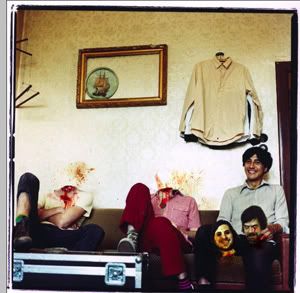
My girlfriend and I are driving to St. Louis later this afternoon. It'll be the first time I've visited in close to a year. The days before a trip always get me sentimental, and I started to think about the musical influence that living in St. Louis had on me.
It seems like an odd location to serve as a hub for Midwestern experimental music, but it is.
Skin Graft Records started in St. Louis, moved to Chicago, and has since returned. Their early catalog is expansive and impressive:
The Flying Luttenbachers,
Dazzling Killmen,
U.S. Maple,
You Fantastic!, etc. and is largely responsible for people not wanting to ride in my car with the stereo on from 2001 - 2004. Many of the bands have roots in St. Louis but took residence in Chicago. This is typical of many St. Louis bands, who move to Chi-town and erase the Lou from their bios (
90 Day Men, I'm looking at you).
However, there is one band that has not only steadfastly planted its roots in St. Louis, but celebrates the city in its songs and titles:
Grand Ulena. The trio, made up of Darin Gray (ex-Killman, and often the bass player Jim O'Rourke calls for album work), guitarist Chris Trull and drummer Danny McClain, have released one album, an ep, and a split 7" with Sicbay. They played their first show with
Wilco (!) at
the Pageant in St. Louis in October of 2001. The crowd, many of whom have been Wilco fans since
AM, were very gracious toward Grand Ulena for a good ten or fifteen minutes. This was due in part to Jeff Tweedy introducing them as "the best band you'll ever, ever see." When it became clear that, yes, this was their set, and they weren't just dicking around before starting a more traditional rock song, the crowd began to turn. First came the restlessness, then shouting and catcalls. The band remained unfazed. I was sold.
Below are three songs, two from their debut album
Gateway to Dignity and the title-track from their EP. As is typical of the band, one of the album tracks is named after a St. Louis street, the other a reference to a town on the Kansas/Missouri border, and the EP is named after a town south of Kansas City near Joplin, Missouri. Their songs are polyphonic, polyrhythmic, polyeverything.
Grand Ulena -- Gravois Means RubbleGrand Ulena -- Total JoplinGrand Ulena -- Neosho
 We here at the Hall of Owls love Liars. Drum's Not Dead appeared on many of 2006's best of lists, yet the band was already recording their next record. There was much speculation about their musical direction after something as cohesive as Drum, but when a recent article on Pitchfork used phrases like "guitar solos" and "Neil Young," many fans were left scratching their heads.
We here at the Hall of Owls love Liars. Drum's Not Dead appeared on many of 2006's best of lists, yet the band was already recording their next record. There was much speculation about their musical direction after something as cohesive as Drum, but when a recent article on Pitchfork used phrases like "guitar solos" and "Neil Young," many fans were left scratching their heads.








